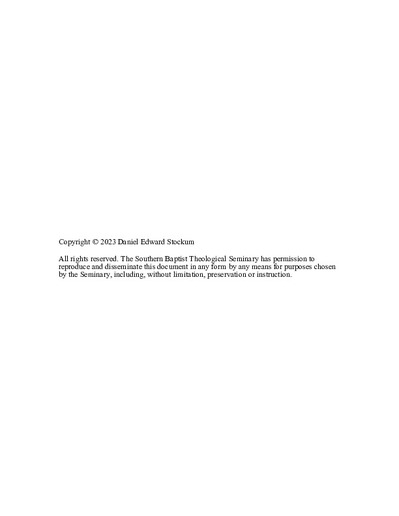| dc.description.abstract | This dissertation examines the communal practices of mutual support, vulnerability, forgiveness, and accountability as well as their correlation with the sense of belonging that members feel in regard to a church community. It utilizes Trinitarian scholarship, biblical imperatives for communal practices, historical investigations of Christian communities, and modern psychological research. Additionally, an empirical case study is performed in which the practices of mutual support, vulnerability, forgiveness, and accountability are emphasized in a church congregation.
Following an introductory chapter, chapter 2 focuses on Trinitarian scholarship of perichoresis and carefully examines how the love between Father, Son, and Holy Spirit informs proper loving relationships between Christians. Specific attention is given to Jesus’s prayer in John 17 petitioning that the church would be one as He and the Father are one. In chapter 3, the biblical imperatives for communal practices are examined. They are rooted in Christ’s love for His church, provide a comprehensive rubric for fellowship among church members, and are one means by which the church makes Christ known to the world. In chapter 4, the historical investigation includes studies of the Moravians, John Wesley’s societies, and Dietrich Bonhoeffer’s Finkenwalde community. These three groups show remarkable commonality in the practices of mutual support, vulnerability, forgiveness, and accountability. In chapter 5, modern psychological research, while not authoritative in isolation, provides insights into the benefits of obedience and the pain of disobedience in regard to biblically commanded communal practices. In particular, studies of attachment theory, group identification, and one’s sense of belonging reinforce scriptural one-another mandates. In chapter 6, the empirical study of a church congregation utilizes the revised and campus social connectedness scales, which are validated survey instruments used to measure one’s sense of belonging to a group. From these five fields of study, a unified conclusion is drawn that mutual support, vulnerability, forgiveness, and accountability are indeed correlated to the members’ sense of belonging in a church. | en_US |

